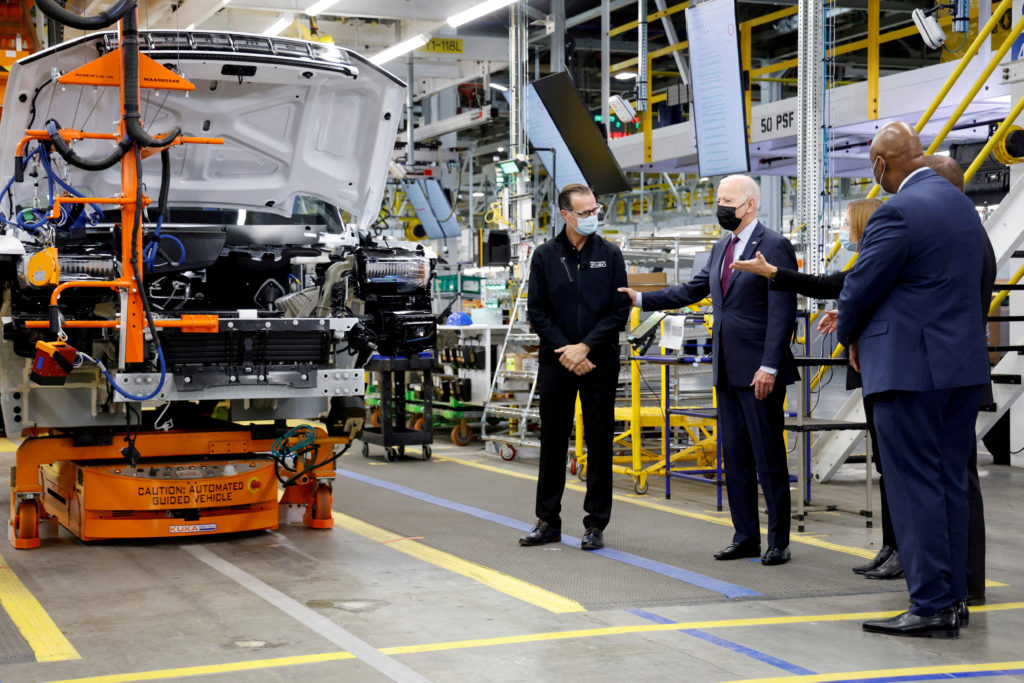Dealerships Step Up Pressure Against Mandatory EV Sales

Table of Contents
Economic Viability Concerns of Mandatory EV Sales
The economic implications of mandatory EV sales are a central point of contention for dealerships. The transition requires significant upfront investments and faces uncertainty regarding consumer acceptance.
High Upfront Investment Costs for Dealerships
Adapting to the EV market presents considerable financial burdens for dealerships. This is not merely a case of stocking new inventory; it demands a comprehensive overhaul of their operations.
- Need for specialized EV training for mechanics: Servicing EVs requires specialized knowledge and tools, necessitating costly training programs for existing mechanics.
- Investment in charging infrastructure: Dealerships must invest in installing and maintaining charging stations, a significant capital expenditure that varies depending on the size and location of the dealership.
- Potential for unsold EVs tying up capital: Unlike traditional gasoline vehicles, EVs may be more susceptible to slower sales due to factors like higher initial cost and range anxiety. This can tie up significant capital in unsold inventory.
The financial burden of adapting to EV sales is substantial, particularly when compared to the relatively lower investment needed for servicing and selling internal combustion engine (ICE) vehicles. Dealerships argue that mandatory quotas risk financial instability, especially for smaller businesses.
Uncertain Consumer Demand for EVs
Even with government incentives, consumer demand for EVs remains a crucial unknown influencing the feasibility of mandatory sales targets. Several factors contribute to this hesitancy:
- Range anxiety: The fear of running out of battery power before reaching a charging station remains a significant barrier for many potential EV buyers.
- Charging infrastructure limitations: The lack of widespread, reliable public charging infrastructure makes long-distance travel in EVs less appealing to many consumers.
- Higher purchase prices of EVs compared to ICE vehicles: Despite government subsidies, EVs often carry a higher upfront purchase price than comparable ICE vehicles, making them inaccessible to a large segment of the population.
- Lack of consumer awareness about EV benefits: Many consumers remain unaware of the full range of benefits associated with EV ownership, such as lower running costs and reduced environmental impact.
Dealerships argue that imposing mandatory sales quotas without addressing these underlying consumer concerns could lead to substantial losses and potentially drive dealerships out of business.
Infrastructure Challenges Hinder EV Adoption
The current state of EV infrastructure presents another major obstacle to the rapid adoption of EVs and fuels the dealerships' opposition to mandatory sales.
Inadequate Charging Infrastructure
The lack of a robust and evenly distributed charging network is a major deterrent to EV adoption. This deficiency manifests in several ways:
- Lack of public charging stations: Many areas, particularly in rural regions, lack sufficient public charging stations, limiting the practicality of EV ownership.
- Inconsistent charging standards: The lack of standardization in charging connectors and protocols adds complexity and inconvenience for EV drivers.
- Long charging times: Charging times for EVs, even with fast chargers, can be significantly longer than refueling a gasoline vehicle, causing range anxiety and inconvenience.
- Uneven distribution of charging points across geographical areas: The availability of charging points is often concentrated in urban areas, leaving rural communities underserved.
This inadequate infrastructure directly impacts consumer confidence and, consequently, the demand for EVs.
Grid Capacity Limitations
The widespread adoption of EVs places significant strain on the existing electricity grid.
- Potential strain on the electricity grid: A massive influx of EV charging demands could overload the grid, leading to power outages and instability.
- Need for grid upgrades to handle increased EV charging demand: Significant investments are needed to upgrade and modernize the electricity grid to accommodate the increased demand from EV charging.
- Cost of grid modernization: The cost of upgrading the grid is substantial and raises questions about who will bear these expenses – consumers, taxpayers, or energy companies.
The challenges related to grid capacity are not just technical but also carry substantial financial implications, adding another layer to the dealerships’ concerns about mandatory EV sales.
Dealer Lobbying Efforts and Strategies
Facing the economic and infrastructural challenges, dealerships are actively employing various strategies to counter mandatory EV sales policies.
Political Lobbying and Advocacy
Dealerships are engaging in significant lobbying efforts to influence policymakers and shape the narrative around EV adoption.
- Collaboration with industry associations: Dealerships are working with industry associations like the National Automobile Dealers Association (NADA) to present a unified front and exert greater political influence.
- Engagement with lawmakers: Dealerships are directly engaging with lawmakers at both the state and federal levels to express their concerns and advocate for alternative policies.
- Public relations campaigns to influence public opinion: Dealerships are undertaking public relations campaigns to inform consumers and policymakers about the challenges associated with rapid EV adoption.
Legal Challenges to Mandatory EV Sales Regulations
Dealerships are exploring legal avenues to challenge the constitutionality and economic feasibility of mandatory EV sales regulations.
- Potential legal battles: Dealerships may file lawsuits to challenge the legality of mandatory EV sales quotas, arguing that they are economically unfeasible and infringe on their business operations.
- Arguing against government overreach: Dealerships may argue that mandatory EV sales quotas represent government overreach and undermine free-market principles.
- Highlighting economic and constitutional concerns: Legal challenges will emphasize the economic hardship faced by dealerships and the potential violation of constitutional rights related to property and due process.
Conclusion
Dealerships are actively resisting mandatory electric vehicle (EV) sales through a multifaceted approach, citing significant economic hurdles, inadequate infrastructure, and uncertain consumer demand. Their lobbying efforts and potential legal challenges highlight the deep-seated apprehension within the automotive industry regarding the rapid transition to EVs. The debate surrounding mandatory EV sales is far from resolved. Understanding the viewpoints of dealerships, their concerns regarding the economic viability and infrastructure challenges associated with mandatory EV sales, is critical for establishing effective and sustainable policies that promote both EV adoption and the long-term prosperity of the automotive industry. Further dialogue and collaboration on this issue are necessary to find solutions that benefit both consumers and the industry.

Featured Posts
-
 Gerard Hernandez Se Confie Sur Son Jeu D Acteur Avec Chantal Ladesou Dans Scenes De Menages
May 12, 2025
Gerard Hernandez Se Confie Sur Son Jeu D Acteur Avec Chantal Ladesou Dans Scenes De Menages
May 12, 2025 -
 Mirnye Peregovory Protivorechiviy Plan Trampa I Reaktsiya Dzhonsona
May 12, 2025
Mirnye Peregovory Protivorechiviy Plan Trampa I Reaktsiya Dzhonsona
May 12, 2025 -
 Shevchenkos New Dragon Inspired Ufc Gear A Closer Look
May 12, 2025
Shevchenkos New Dragon Inspired Ufc Gear A Closer Look
May 12, 2025 -
 The John Wick Universe Is A Fan Favorite Characters Return Possible
May 12, 2025
The John Wick Universe Is A Fan Favorite Characters Return Possible
May 12, 2025 -
 Calvin Kleins New Campaign With Lily Collins Images And Details
May 12, 2025
Calvin Kleins New Campaign With Lily Collins Images And Details
May 12, 2025
Latest Posts
-
 The Future Of The Mtv Movie And Tv Awards After 2024
May 12, 2025
The Future Of The Mtv Movie And Tv Awards After 2024
May 12, 2025 -
 Report Mtv Movie And Tv Awards On Hiatus For 2025
May 12, 2025
Report Mtv Movie And Tv Awards On Hiatus For 2025
May 12, 2025 -
 Is The 2025 Mtv Movie And Tv Awards Show Cancelled
May 12, 2025
Is The 2025 Mtv Movie And Tv Awards Show Cancelled
May 12, 2025 -
 The Future Of Mtv After The Cbs Vma Simulcast
May 12, 2025
The Future Of Mtv After The Cbs Vma Simulcast
May 12, 2025 -
 The Challenge 41 Spoilers Reveal A Major Upset
May 12, 2025
The Challenge 41 Spoilers Reveal A Major Upset
May 12, 2025
